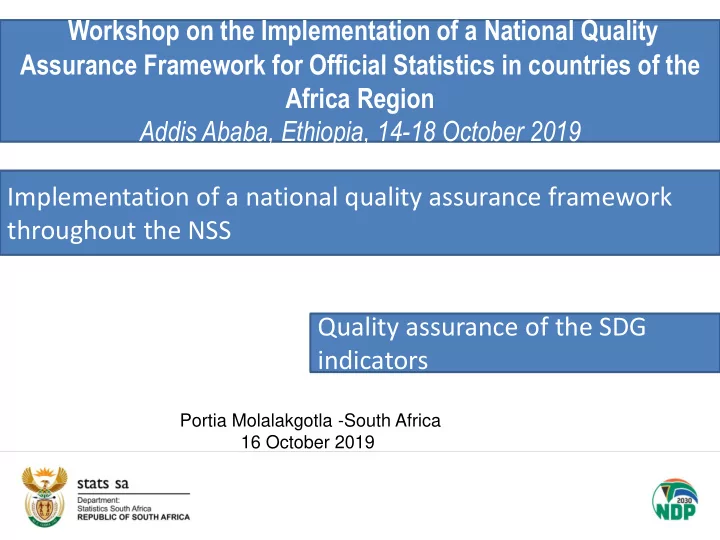

Workshop on the Implementation of a National Quality Assurance Framework for Official Statistics in countries of the Africa Region Addis Ababa, Ethiopia, 14-18 October 2019 Implementation of a national quality assurance framework throughout the NSS Quality assurance of the SDG indicators Portia Molalakgotla -South Africa 16 October 2019
Contents • Objectives • SASQAF Lite assessment • Outputs from the assessment • Successes and challenges
Quality assurance on SDG indicators
Reasons for assessing quality of data sources used for reporting? • To shed light to users on the quality of indicators used to report progress • Guideline for choosing the suitable data source for populating indicators. • To enhance transparency in the choice of datasets to populate indicators
South African Statistical Quality Assurance Framework (SASQAF) 9 Dimensions Credible information on indicators will be obtained through SASQAF Indicators (idct) Standards (std) Integrity (6 idct 6 std) Accessibility (12 idct 13 std) Accuracy (7 idct 36 std) Relevance (5 idct 5 std) Timeliness (4 idct 10 std) Pre-requisites Interpretability (8 idct 21 std) (3 idct 3 std) Comparability & Coherence Methodological Soundness (5 idct 5 std) (6 idct14 std)
SASQAF – UN NQAF SASQAF UN NQAF Dimension Level Indicator Principle Standard Requirement Benchmark Elements
SASQAF Lite (4 dimensions) on international reporting obligations Accuracy Comparability and coherence Methodological Soundness Integrity Timeliness (Optional)
Quality assurance (NSO through SANSS as the Coordinator) Indicators for reporting • Metadata should be checked for metadata and quality • SASQAF Lite Assessment of the data source used 4. Data source choice 3. Compilation of the Assessment report with findings, recommendations and limitations Stages of assurance 2. Working Teams (2 assessor and 1 metadata provider) 1. Identification of data sources for indicators (Only NSS members)
OUTPUT – Quality report Findings Recommendations with cautionary notes
Moving Forward with the SDG goals in South Africa
Quality is key
Success Coordinating Departmental, CSO and private 01 representation in SDG structures SDG meetings and Sectoral Working Groups K E Y An opportunity to create awareness of quality 02 to non-NSS members S U C C E S S E S
Challenges Sheer volume of indicators 01 Lack of enough resources to assess all the data sources K E Y C H A L L E N G E S Access to possible new data sources from non traditional data suppliers (Private sector) – how to 02 deal with governance issues emanating from this?
Thank you
Recommend
More recommend